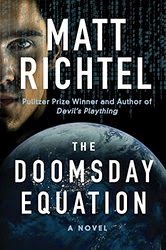Matt Richtel is the author of the new novel The Doomsday Equation. A Pulitzer Prize-winning reporter for The New York Times, his other books include A Deadly Wandering, The Cloud, and Devil's Plaything. He lives in San Francisco.
Q: How did you come up with your main character, Jeremy
Stillwater?
A: I wanted to think about or ask readers to think about the
way low-level personal conflict can add up. I decided to embody that in someone
who is completely drawn to conflict. It gave me a chance to play with the idea
that we are often critical of others without adding our own contribution to a
world riven with conflict. It’s easy to point a finger at Jeremy [but] maybe he
told us something about [ourselves].
Also, I liked the idea…of [writing about] a jerk. Some
reviews said, Gosh, I hate this guy. One of my favorite moments is when he’s
trying to pick up a woman, and his desire for conflict is so great that he
insults her and she slaps him [and he feels good about it]. That really
captures a jerk.
Q: You mentioned that you were hoping people would see his
character develop through the book.
A: Some did, some didn’t. Given that I’m prolific, or very
passionate [about my writing], I can’t always tell if I moved too quickly. Some
of the reaction is that he’s a complete jerk, and I feel I made an effort to
have him evolve—the only way he’ll save the world is by understanding a bit
about himself.
I think he does transform, even slightly. It’s probably a
mistake in any book to allow the reviews to dictate what happens in a book,
because perceptions may vary. If I’ve done it right, the onus is on me to have
them see he’s something bigger than a jerk—he’s a soulful creature who needs to
[find himself].
Q: Is there a real-life equivalent to Jeremy’s computer in
the book?
A: It’s drawn from a real-life guy and a real-life computer.
The real-life guy is much nicer and the real-life computer is much more
powerful….
This is so in the realm of what’s happening right now, the
way Big Data is crunched to make predictions about group behavior, individual
behavior, the weather, the stock market. We are in the infancy of it, and this
book is maybe in the teenage years, but it’s not so far off….
Q: Is there a computer now that actually predicts conflict,
like the computer in the book?
A: There is a mathematical equation that does it on a
primitive basis. Sean Gourley [who created it] has even had conversations with
the government.
My guess is the human pattern recognition and experience
still trumps the uncertainty of trying to predict conflict—there are too many
variables to rely on a computer for something with such big stakes.
As we begin to understand the impacts better, no human brain
can add up all the pieces the way a computer can, but a computer doesn’t have
gut feelings. Given the life-and-death stakes, we’d better be sure before we
outsource it to Siri.
Q: What is the real “Guardians” group on which you base your
group in the book?
A: I’ve been a little cartoonish, but there’s something
under the surface. The real Guardians group is Neturei-Karta, a group of
Orthodox super-religious Jews who did not believe in the founding of a secular
Israel—they believed it would go against the true return of the Messiah.
What I found interesting, metaphorically—I’m thinking more
on a broad level about low-level strongly held views that many people have that
prevent compromise.
I am not making a broad statement about religion, but you
look across the world now, whether you’re looking at Israel, or at Indiana with
the Religious Freedom Act…beneath the surface of this, what I’m trying to get
at [with] these political battles is a certain kind of [situation] where some
people believe that if they compromise on their basic beliefs, something really
terrible will happen, like the Messiah won’t come or they will be betraying
their most important beliefs. It gets hard to compromise [on the big issues]. …
Q: I know you’ve written fiction and nonfiction and a
children’s book—what are you working on now?
A: The book we’re talking about today was done three years ago
and held back because the publisher wanted to put out A Deadly Wandering first.
When A Deadly Wandering was being edited, I [worked on] a
piece of fiction that will come out next year, the girl eXtra. It’s the story
of a girl from an affluent San Francisco family who goes missing. It has a
little bit of the noir detective style…[and looks at] child-rearing in the age
of haves and have-nots. I think [my books have] gone from slightly trashy to
slightly literary.
--Interview with Deborah Kalb. For a previous Q&A with Matt Richtel, please click here.



No comments:
Post a Comment